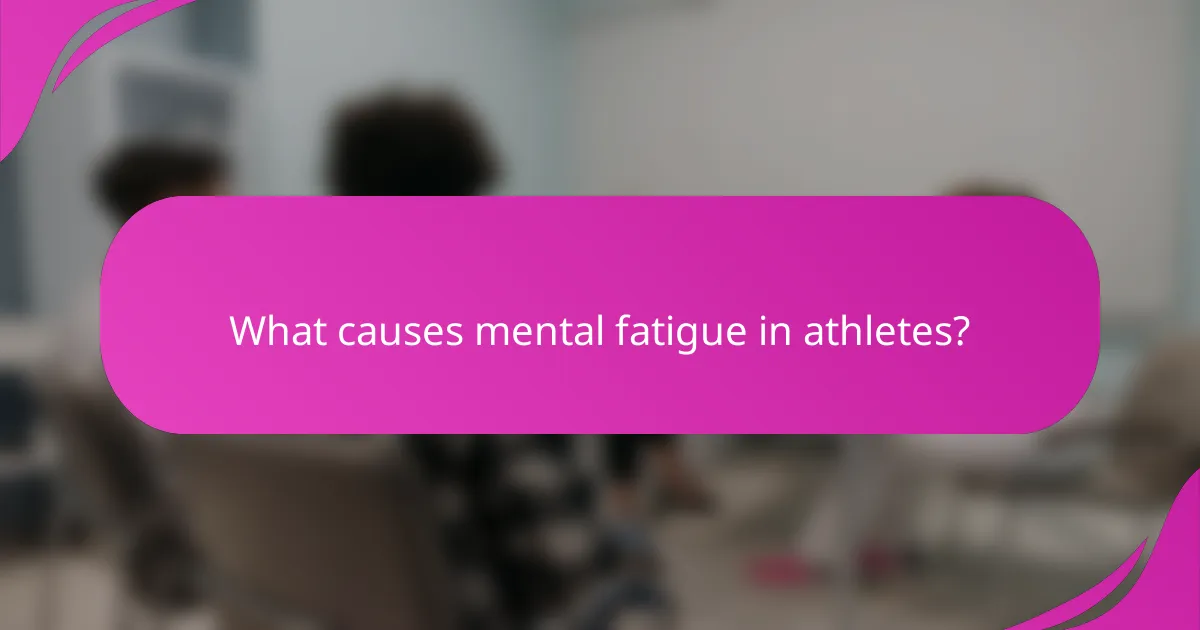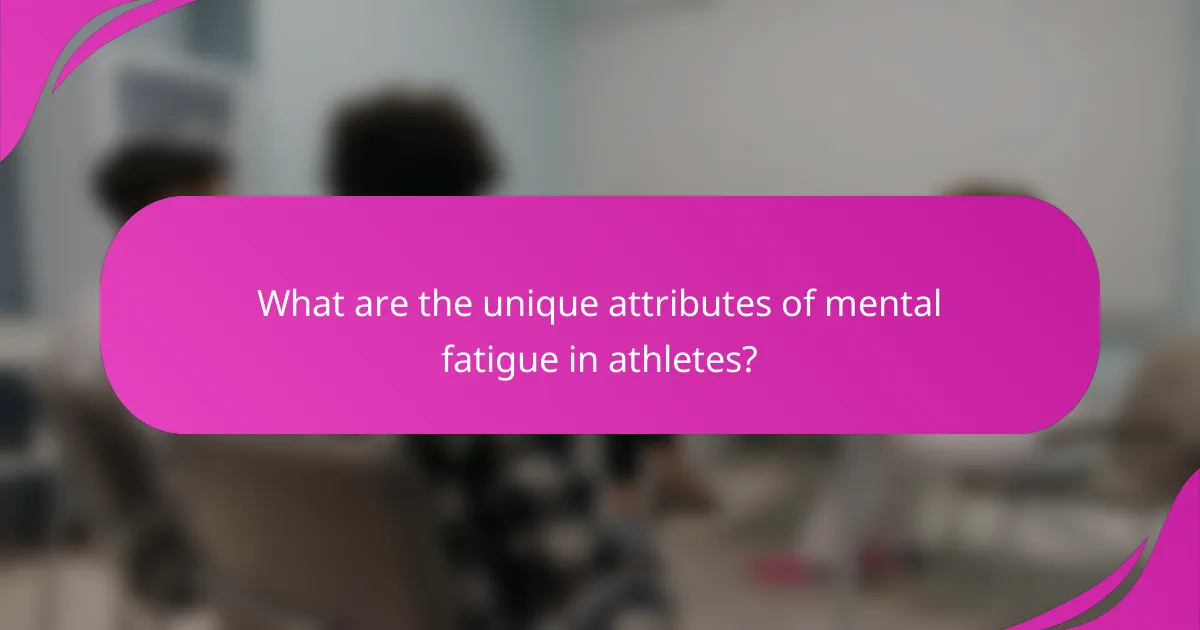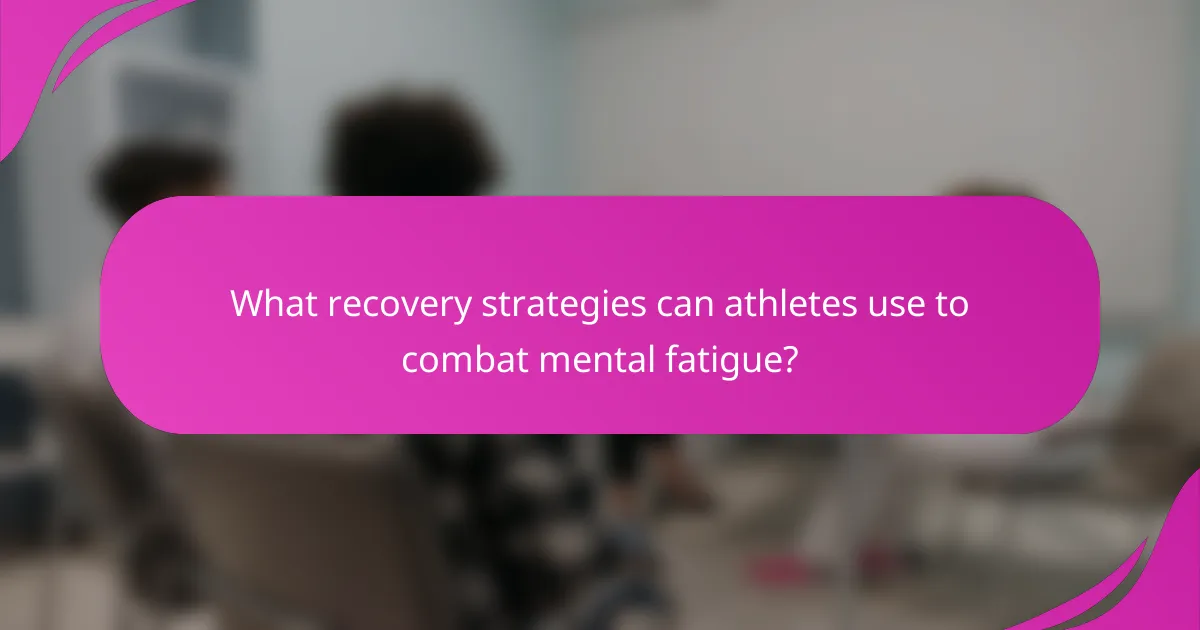Mental fatigue in athletes can severely hinder performance and recovery. Recognizing symptoms like decreased concentration and irritability is essential. Understanding the causes, including prolonged training and stress, helps in identifying mental fatigue early. Effective recovery strategies such as mindfulness practices and structured rest periods can restore cognitive function and enhance overall performance.

What are the signs of mental fatigue in athletes?
Mental fatigue in athletes manifests through various signs, including decreased concentration, irritability, and lack of motivation. These symptoms can result from prolonged training, stress, or inadequate recovery. Athletes may also experience sleep disturbances and physical exhaustion. Recognizing these signs early is crucial for effective recovery strategies, which may include rest, mental breaks, and mindfulness practices.
How can athletes identify symptoms of mental fatigue?
Athletes can identify symptoms of mental fatigue through signs such as decreased motivation, irritability, and difficulty concentrating. Recognizing these symptoms is crucial for maintaining performance. Common indicators include persistent tiredness, lack of enthusiasm for training, and increased anxiety levels. Monitoring these signs helps athletes understand their mental state and take appropriate recovery steps.
What physical indicators signal mental fatigue?
Physical indicators of mental fatigue include decreased concentration, increased irritability, muscle tension, and changes in sleep patterns. These symptoms can manifest as reduced performance in athletes, impacting their physical and mental capabilities. Recognizing these signs early is crucial for effective recovery strategies.
What psychological symptoms are associated with mental fatigue?
Mental fatigue in athletes can lead to various psychological symptoms. Common signs include decreased motivation, irritability, anxiety, and difficulty concentrating. These symptoms may hinder performance and overall well-being. Recognizing these signs early can facilitate timely recovery strategies.
What cognitive effects does mental fatigue have on performance?
Mental fatigue significantly impairs athletic performance by reducing focus, decision-making, and reaction times. Symptoms include decreased motivation, increased errors, and slower physical responses. Research indicates that mental fatigue can lead to a 20% decline in performance metrics. Recovery strategies involve adequate rest, hydration, and mental breaks to restore cognitive function.

What causes mental fatigue in athletes?
Mental fatigue in athletes is primarily caused by prolonged physical exertion, psychological stress, and inadequate recovery. Symptoms include decreased concentration, irritability, and lack of motivation. Factors such as overtraining, poor nutrition, and insufficient sleep further exacerbate mental fatigue. Recovery strategies involve rest, mental relaxation techniques, and balanced nutrition to restore cognitive function and performance.
How do training loads contribute to mental fatigue?
Training loads can significantly contribute to mental fatigue in athletes by overwhelming their cognitive resources. High training intensity and volume lead to increased stress and decreased focus, resulting in symptoms such as irritability, lack of motivation, and impaired decision-making. Monitoring training loads helps identify thresholds that, when exceeded, can trigger mental fatigue, impacting performance and recovery. Effective management strategies include adjusting training intensity, incorporating rest periods, and ensuring proper nutrition to mitigate mental fatigue and enhance overall athlete well-being.
What role does competition stress play in mental fatigue?
Competition stress significantly contributes to mental fatigue in athletes. It can lead to decreased focus, increased anxiety, and diminished performance. Athletes may experience signs such as irritability, lack of motivation, and difficulty concentrating. These symptoms arise from the pressure to perform, which can overwhelm mental resources. Effective recovery strategies include stress management techniques, adequate rest, and mental conditioning to enhance resilience against competition-related stress.
How do lifestyle factors influence mental fatigue?
Lifestyle factors significantly influence mental fatigue in athletes. Poor nutrition, inadequate sleep, and high stress levels can exacerbate symptoms. Athletes with balanced diets and regular sleep patterns experience lower mental fatigue, enhancing performance. Additionally, effective stress management techniques can mitigate fatigue, promoting recovery and overall well-being.

What are the unique attributes of mental fatigue in athletes?
Mental fatigue in athletes is characterized by diminished concentration, increased irritability, and reduced motivation. Unique attributes include cognitive overload, emotional exhaustion, and impaired decision-making. These symptoms can significantly impact performance and recovery. Identifying these unique signs is crucial for effective management and support in athletic training.
How does mental fatigue differ from physical fatigue?
Mental fatigue differs from physical fatigue in that it primarily affects cognitive functions rather than physical performance. Mental fatigue manifests through symptoms such as decreased concentration, irritability, and reduced motivation, while physical fatigue is characterized by muscle weakness and exhaustion. Athletes may experience mental fatigue due to prolonged training, stress, or emotional strain, impacting their decision-making and reaction times. Recovery strategies for mental fatigue include adequate rest, mindfulness practices, and mental conditioning exercises, which help restore focus and enhance overall performance.
What are the long-term effects of untreated mental fatigue?
Long-term effects of untreated mental fatigue can include chronic stress, decreased performance, and increased risk of burnout. Athletes may experience persistent exhaustion, impaired concentration, and emotional instability. Over time, these symptoms can lead to serious health issues such as anxiety and depression. Addressing mental fatigue promptly is crucial for maintaining overall well-being and performance.

What are the rare attributes of mental fatigue in athletes?
Rare attributes of mental fatigue in athletes include cognitive overload, emotional detachment, and decreased motivation. These symptoms often manifest in unexpected ways, such as a lack of enthusiasm for training or competition. Athletes may also experience impaired decision-making and slower reaction times, which are less commonly recognized as signs of mental fatigue. Understanding these rare attributes can aid in identifying mental fatigue earlier, allowing for more effective recovery strategies.
How can mental fatigue manifest differently in various sports?
Mental fatigue manifests differently across sports due to varying demands and mental engagement levels. In endurance sports, athletes may experience decreased concentration and slower decision-making. Team sports often show signs like irritability and communication breakdown. Individual sports can lead to heightened anxiety and self-doubt. Recovery strategies must be tailored to each sport’s unique mental challenges, emphasizing rest, mental training, and support systems.
What unique recovery strategies are effective for mental fatigue?
Effective recovery strategies for mental fatigue include mindfulness practices, adequate rest, and structured breaks. Mindfulness techniques, such as meditation, enhance focus and reduce stress. Prioritizing sleep is crucial; athletes should aim for 7-9 hours nightly. Structured breaks during training sessions can prevent burnout and improve overall performance. These strategies uniquely address mental fatigue, fostering resilience and mental clarity.

What recovery strategies can athletes use to combat mental fatigue?
Athletes can use various recovery strategies to combat mental fatigue, including mindfulness practices, structured rest periods, and cognitive behavioral techniques. Mindfulness helps in reducing stress and enhancing focus. Structured rest allows for mental recovery, while cognitive behavioral techniques can address negative thought patterns. Incorporating these strategies can significantly improve mental resilience and performance.
How can athletes implement rest and recovery techniques?
Athletes can implement rest and recovery techniques by recognizing signs of mental fatigue and applying effective strategies. Techniques include scheduled breaks, sleep optimization, mindfulness practices, and active recovery exercises. Monitoring stress levels and adjusting training intensity are crucial for maintaining mental wellness. Incorporating these methods can enhance performance and prevent burnout.
What role does sleep play in recovery from mental fatigue?
Sleep is crucial for recovery from mental fatigue as it restores cognitive function and enhances mood. Adequate sleep improves memory consolidation and decision-making, both essential for athletes. Research shows that sleep deprivation can impair performance, leading to increased errors and slower reaction times. Prioritizing sleep as part of recovery strategies can significantly reduce symptoms of mental fatigue in athletes.
How can relaxation techniques aid in recovery?
Relaxation techniques significantly aid recovery by reducing mental fatigue in athletes. These methods lower stress hormones, enhance focus, and promote emotional well-being. Techniques such as deep breathing, progressive muscle relaxation, and mindfulness meditation can improve overall mental clarity. As a result, athletes experience quicker recovery times and better performance outcomes. Regular practice of these techniques fosters resilience against mental fatigue, contributing to sustained athletic performance.
What nutritional strategies support mental recovery?
A balanced diet rich in omega-3 fatty acids, antioxidants, and vitamins supports mental recovery. Key strategies include increasing intake of fatty fish, fruits, and vegetables. Omega-3s enhance cognitive function and mood, while antioxidants combat oxidative stress. Regular hydration also plays a crucial role in maintaining mental clarity.
How can mental conditioning techniques help athletes recover?
Mental conditioning techniques can significantly enhance athletes’ recovery by addressing mental fatigue. These techniques improve focus, reduce anxiety, and promote positive self-talk, leading to better overall performance. Identifying signs of mental fatigue, such as decreased motivation and increased irritability, allows athletes to implement targeted recovery strategies. Techniques like visualization and mindfulness can help reset mental states, aiding in faster recovery and enhancing resilience against future fatigue.

What best practices can athletes adopt to prevent mental fatigue?
Athletes can prevent mental fatigue by adopting several best practices. Prioritizing sleep enhances recovery and cognitive function. Regular mindfulness practices, such as meditation, can reduce stress and improve focus. Creating a balanced training schedule with rest days prevents burnout. Additionally, engaging in social support networks fosters emotional resilience. Lastly, maintaining a healthy diet supports overall mental health and energy levels.
What are common mistakes athletes make regarding mental fatigue?
Athletes often overlook signs of mental fatigue, leading to poor performance. Common mistakes include ignoring symptoms like decreased motivation, difficulty concentrating, and irritability. Many athletes fail to recognize the impact of mental fatigue on physical performance, believing it to be solely a physical issue. Additionally, they may not implement effective recovery strategies, such as rest and mental breaks, which are crucial for optimal performance. Recognizing these mistakes is vital for enhancing both mental and physical well-being.
How can athletes optimise their training to reduce mental fatigue?
Athletes can optimize training to reduce mental fatigue by incorporating structured recovery techniques. Prioritizing rest, utilizing mindfulness practices, and adjusting training loads are effective strategies.
Rest days are essential for mental recovery, allowing the brain to recuperate. Mindfulness practices, such as meditation, enhance focus and reduce stress. Adjusting training loads prevents overtraining, which can lead to burnout.
Monitoring mental fatigue signs, like decreased motivation and concentration, helps athletes make timely adjustments. Implementing these strategies can significantly improve performance and mental resilience.
What expert insights can help athletes manage mental fatigue effectively?
Expert insights emphasize the importance of recognizing mental fatigue signs early. Key strategies include structured rest periods, mindfulness practices, and cognitive behavioral techniques. These methods help athletes regain focus and enhance performance. Research indicates that regular mental breaks can significantly reduce fatigue levels, promoting better recovery and resilience. Engaging in mental conditioning exercises also aids in managing stress and maintaining optimal mental health.